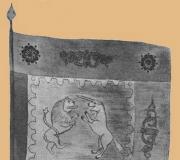How to learn Arabic from scratch. How to learn Arabic on your own
The article “Arabic on your own” was prepared by Masha Savrasova, who, before starting classes with a teacher, studied independently for almost a year and a half Arabic from scratch and quite well mastered the Syrian dialect and modern standard Arabic. Perhaps her experience will be useful to some of you.
I got the motivation to study Arabic after traveling around the Arab East (Syria, Jordan). I realized that I would come there more than once, and decided to learn Arabic. It was more convenient for me to study on my own because I did not want to impose financial and time restrictions on myself associated with attending courses or private lessons. In addition, it became interesting whether it was possible to make serious progress in Arabic without outside help.
I made it a rule for myself to exercise every day, at least for five minutes.
I had enough desire, but there was a problem with teaching aids. The fact is that there are very few high-quality Arabic language textbooks that you can use on your own from the beginning level, or rather, there are none in Russian (at least I haven’t seen them), and even in English language There are also not too many of them, and besides, you usually have to buy English-language textbooks through online stores, that is, without seeing the textbook and without being able to form your own opinion about it. Therefore, I decided to briefly talk about the audio courses, textbooks and manuals that I used. I hope this will help you reduce the time spent searching for effective training courses.
So, when I started learning Arabic,
I. First of all, I looked at the materials on the Internet, and with the help of a “learning book” on the website http://www.arabesque.boom.ru/ I learned the alphabet. However, some time later I returned to this topic again, as I discovered some errors in myself, so I would not definitely recommend this site for learning the alphabet.
II. Then I bought the Arabic Visa audio course, which I listened to diligently. In the absence of fish, of course, there is cancer in fish, but, to tell the truth, the course is terrible, its only advantage is that it is spoken by Arabs (this helps you get used to the sound of the language), but this does not compensate for the shortcomings of the course. I don't actively recommend him to anyone.
III. Then I came across a good phrasebook from the Berlitz series (it’s better to buy it complete with a cassette). The disadvantage of this phrasebook (as well as many others) is that most phrases are given in standard Arabic (which is not used in everyday communication), while some of the material is given in dialects, and different ones.
IV. On the advice of a friend who, like me, also taught Arabic and was already somewhat familiar with English-language textbooks, I purchased a textbook of modern standard Arabic from the Teach Yourself series “A complete course in reading and writing Arabic” by Jack Smart, Frances Altorfer. Cassettes are included with the textbook. I studied with this textbook for several months and was very pleased with it. Today, I believe that this is one of the best (though not the best) textbooks that you can use to study Arabic on your own. This textbook can be ordered from foreign online stores such as http://www.amazon.com.
V. After another trip to the Middle East, I came to the conclusion that I need to learn the dialect. And I began studying the course Syrian Colloquial Arabic, a Functional Course by Mary-Jane Liddicoat, Richard Lennane and Dr Iman Abdul Rahim, downloaded from the website http://www.syrianarabic.com. The website contains both the textbook and the mp3 files accompanying the course. The course is wonderful, very clear and allows you to achieve a good level of proficiency in the Syrian dialect.
VI. At some point, I discovered that I was not writing some letters quite correctly, and I had to go back to where I started. I completed the textbook Alif Baa, Introduction to Arabic Letters and Sounds by Kristen Brustad, Mahmoud Al-Batal, Abbas Al-Tonsi. This textbook is the first, introductory part of Al - Kitaab Language Program. The textbook is excellent and the best place to start learning Arabic is with it. The textbook contains a lot of exercises on writing, reading and very good wheels(you must have them), thanks to which you can even set the pronunciation yourself. The textbook can be ordered from foreign online stores such as http://www.amazon.com.
VII. Based on my own impressions of the Alif Baa textbook and reviews on http://www.amazon.com, I bought the continuation of Al - Kitaab Language Program: Al - Kitaab fii Taallum al - Arabiyya A Textbook for Beginning Arabic Part One by Kristen Brustad, Mahmoud Al - Batal, Abbas Al - Tonsi. I consider this textbook to be the best standard Arabic textbook.
Subsequently, I began to study at the Arabic Language Club. My teacher is Zhorzhina. And, of course, despite the fact that I myself was convinced of the possibility of learning Arabic on my own, it is obvious that having a good teacher (especially a native speaker) speeds up the process of mastering the language many times over.
However, for those who would like to learn Arabic on their own, I can recommend the following textbooks.
* For learning or reviewing the basics of Arabic, the textbook Alif Baa, Introduction to Arabic Letters and Sounds by Kristen Brustad, Mahmoud Al - Batal, Abbas Al - Tonsi is ideal. You must have the textbook itself, CDs and keys to the exercises. (You don’t have to buy a video cassette or DVD, they don’t justify their cost).
* Best choice for learning classical and modern standard Arabic there will be Al - Kitaab fii Taallum al - Arabiyya A Textbook for Beginning Arabic Part One by Kristen Brustad , Mahmoud Al - Batal , Abbas Al - Tonsi . It is necessary to have the textbook itself and disks, the rest (keys, videos and DVDs) is not necessary.
* If you are interested in learning the dialects of the Levant countries (Syria, Jordan, Lebanon, Palestine), I recommend using the course Syrian Colloquial Arabic, a Functional Course by Mary-Jane Liddicoat, Richard Lennane and Dr Iman Abdul Rahim, downloading it from the site http: //www.syrianarabic.com.
I wish you success in learning Arabic!
- you can find a lot there useful materials in different languages and improve your Arabic on your own in 12 weeks.
Good textbooks on phonetics:
5) Kovalev A.A., Sharbatov G.Sh. “Textbook of the Arabic Language” In the introductory phonetic course, the position of the speech organs when pronouncing all sounds is described in detail and there are exercises for practicing.
6) Lebedev V.G., Tyureva L.S. “Practical course of Arabic literary language. Introductory course" The position of the speech organs when pronouncing all sounds is also described in detail and there are exercises for practicing.
Copybooks
7) Arabic language. Copy. Alphabet, reading, writing (Dilya Publishing House). All Arabic letters in all positions in a word.
8) “Kharisova G.Kh. Arabic script" Also an excellent script.
9) Imran Alawiye Arabic without tears. The manual is beautifully designed, the most common font is given.
Resources for basic skills (reading, writing, speaking, listening):
1. So, you have learned the alphabet and know how to write (albeit clumsily. I myself have terrible handwriting in Arabic, but this is not the main thing, you are not a secretary in an Arab company.) Now you start with this and only with this: First volume Medina course, videos by I. Sarbulatov:
http://www.youtube.com/playlist?list=PL3797F14762B55D79
2.Have you completed the first volume? Moved to the second:
http://www.youtube.com/playlist?list=PL8043CDAAAF80F433
● You need to start EXACTLY with these playlists and not take a step back. These 2 volumes with a clear and understandable explanation by I. Sarbulatov provide a serious starting base. You don’t even need a teacher, just sit down and turn on the video, listen carefully to what he says and write down.
3. With diligent training (3 videos a week, weekends - repeat), it should take you about 2-3 months, depending on your frequency. Don’t say now “ugh, that’s a long time”, this path is worth it and you will already be able to calmly make up children’s sentences like “who is this? This is a rooster.” (What did you want? This is a completely new, still unlearned language for us and we need to treat it normally. If you have seen “Arabic in 2 weeks” manuals in stores etc. and you think that Arabic can be mastered in so many days, then this is complete absurdity. Children begin to speak their native language only after 2-3 years. Don’t forget about it)
4. Repeat what you have learned, read more articles about motivation and don’t give up. We must try, try and try again, no matter what the circumstances. Many people start studying with some phrase books, learning some dialogues in Arabic, etc., thinking that they are thereby learning the language. This is the wrong approach. It’s just unnecessary waste time, believe me. What I am giving you now, I have walked this path myself and Alhamdulillah I have achieved more than those who are still learning Arabic proverbs, sayings and Baranov’s dictionary in order day and night. This will not work. For us first you need a base, a base, a layout, a skeleton. I. Sarbulatov gives this in the best way on video. You don’t even need to hire any tutors.
● Print or buy Abu Adel's book for honey. course and go through/repeat it again. The effect will double, I assure you. I myself went through Abu Adel’s book 2 times.
5. Next comes Volume 3:
http://www.youtube.com/playlist?list=PL9067216426552628
Having reached this level, you will finally become familiar with the so-called “breeds”, and by this time you will understand how this or that word is constructed in Arabic. There is no need to separately learn the words “visitor, writer, player, written, visited, played, told”, etc. You will simply put one corresponding verb in the desired “frame” and get the desired word.
6.You are not required to sit down and sit for hours. Spectator attention - half an hour. During the day - half an hour, in the evening - a little more, and at night - run through the notebook with your eyes. Effect 100%
7.Motivation, strong support - on the website http://nuruliman.ru/ They write convincingly and the words are highly motivating.
8.Make dua. There is no other language that would be mastered as well and quickly as the Arabic language - if you put in niyat for the sake of Allah and with the goal of at least reading His Scripture well (placing correctly logical stresses in words and sentences) and even understanding some words, as well as hadiths . NOT EVERYTHING WILL COME TO US AT ONCE. Make more duas.
9.Motivate yourself as often as possible.
10.If the desire begins to disappear from time to time, see point 9.
11. In the first 3-4 months, do not try to construct serious sentences like “I looked back to see if she looked back, to see if she looked back,” or at least what you see in front of you, and if you fail to construct a sentence, get upset. Don’t even think about it, remember at how many months a child begins to construct sentences. We are absolutely the same children.
12. Ask Allah to make your matter easier for you and turn to experts in Arabic. At least on the Internet.
13. So, you have mastered the first 3 volumes of the medical course, enough time has passed, but you feel that you have really improved compared to what you knew 2-3 months ago. Imagine now WHAT you will know in another six months. Go towards the goal. Set small goals (learn 10 words, then 10 more words: kitaabun, daftarun, masjidun...). By the end of the 3rd volume, you will already have a stock of more than 500 high-frequency words approximately. Iron, iron, love, search, use, read, write, went out, came in, looked, cat, dog, grandmother, grandfather.
14. So. Now we have a small, but still sufficient base for today. How does a child begin to learn a language? That's right, he remembers the words. We will learn the words with you. Which ones? Let's take a dictionary and learn everything? Words that we can only encounter in 80-100 years? Or will we learn high-frequency words that cover 95% of word usage in everyday speech? (Less in written language.) What words will we learn? Nepotism, gestalt ,patrol? Or “student, teacher, wake up, read, laugh, talk,
understand, institute, sea, forest, face, hands”?...
15.I give you ONE OF THE BEST TEXTBOOKS IN THE ENTIRE POST-SOVIET SPACE. This is Bagautdin’s book “Arabic Language Textbook”. Words are given there, then there is a small text where these words are used. There are collected about 4000 words of the MOST USED. I still repeat these words, because in cartoons, in video lectures, these words are everywhere. There is a method of learning words that leads to excellent results. This method is “Words and text” gives amazing results. You first learn the words, and then when you read the text, you are glad that you understand the Arabic text, because you know all the words that are there. This book will take you about six months. This textbook is one of my favorites my textbooks. There is also an audio version on the Internet.
16. That's all for now. This article is for you for one year. Insha Allah, if we are healthy and alive, write to me in a year with the question “what’s next” and if by that time I am still learning Arabic, insha Allah, then I will tell you what to do. )
17. When you learn words, you don’t need to sit for an hour. 15 minutes is enough. We took a picture of the words on our phone, opened it at the university/institute, and repeated. Is it lunchtime at work? We ate, opened the phone, and repeated. The effect is stunning. The effect will be exactly 15 minutes every 4-6 hours.
18. Try. Try. No one promised you ease. Your actions = your result. A person who worked diligently according to the instructions written above, who taught, tried, repeated, cannot tell me after 4 months: “I remained the same as I was.” was there and achieved nothing.” No, you didn’t do anything simple at all. You only deceived yourself.
19. In the photo I wrote a quote from I. Khaibullin’s book, if you want to improve the result of your study, just multiply some point by 2.”Which one is up to you to choose, depending on your abilities.”
20. I advise you to start a notebook where you will write verbs and their prepositions with which they are used. Just as in English prepositions can change the meaning of words (for example: look out = look out, look at), so in Arabic one or another preposition can change the meaning of the verb. Let’s say: نظر الى - to look (at something), and if instead of the preposition الى we say في, then the verb will be translated as “to think about something.” And there are many such examples. Write down at least 200-300 verbs and with what preposition they are used. The verb “zahaba” with the preposition “ila”, “bahaSa” (search) with the preposition “gan”.
For now, this is the plan for you and me. I wrote it hastily, if I need anything I’ll add it, but I think I wrote the main and most important things. May Allah reward the one who reposts and shares with his friends. Maybe they also need these tips.
May Allah help us in all our good endeavors!
Amen.
والحمد لله رب العالمين وصلى الله وسلم على نبينا محمد وعلى آله وصحبه أجمعين
Which is gaining popularity every year. Learning Arabic has its own characteristics, which are related to the structure of the language itself, as well as pronunciation and writing. This must be taken into account when choosing a training program.
Prevalence
Arabic belongs to the Semitic group. In terms of the number of native speakers, Arabic ranks second in the world after Chinese.
Arabic is spoken by about 350 million people in 23 countries where the language is considered an official language. These countries include Egypt, Algeria, Iraq, Sudan, Saudi Arabia, UAE, Bahrain, Palestine and many others. Also, the language is one of the official ones in Israel. Taking this factor into account, learning Arabic involves pre-selection dialect that will be used in a particular country, because, despite many similar elements, in different countries language has its own distinctive features.

Dialects
Modern Arabic can be divided into 5 large groups dialects, which from a linguistic point of view can practically be called different languages. The fact is that lexical and grammatical differences in languages are so large that people speaking different dialects and not knowing the literary language practically cannot understand each other. The following groups of dialects are distinguished:
- Maghreb.
- Egyptian-Sudanese.
- Syro-Mesopotamian.
- Arabian.
- Central Asian.
A separate niche is occupied by modern standard Arabic, which, however, is practically not used in colloquial speech.

Features of the study
Learning Arabic from scratch is not an easy task, since after Chinese it is considered one of the most difficult in the world. Mastering Arabic takes much longer than learning any European language. This applies to both classes with teachers.
Studying Arabic on your own is a difficult path, which is best avoided at first. This is due to several factors. Firstly, the letter is very complex, which is not similar to either the Latin or Cyrillic alphabet, which is written from right to left, and also does not involve the use of vowels. Secondly, the structure of language itself, in particular morphology and grammar, is complex.

What should you pay attention to before you start studying?
A program for learning Arabic should be built taking into account the following factors:
- Having enough time. Learning a language takes several times longer than learning other languages.
- Opportunities for both independent work, and for classes in a group or with a private teacher. Studying Arabic in Moscow gives you the opportunity to combine different options.
- Inclusion in the learning process of different aspects: writing, reading, listening and, of course, speaking.
We must not forget that you need to decide on the choice of a specific dialect. Learning Arabic varies depending on this factor. In particular, the dialects in Egypt and Iraq are so different that their speakers cannot always understand each other. A way out of the situation may be to study the Arabic literary language, which has a more complex structure, but is understandable in all countries of the Arab world, since dialects traditionally have a more simplified form. Despite this, this option also has its own negative sides. Although the literary language is understood by all countries, it is practically not spoken. A situation may arise that a person who speaks a literary language will not be able to understand people who speak a certain dialect. In this case, the choice depends on the purposes of the study. If you want to use a language in different countries, then the choice should be made towards the literary version. If a language is studied for work in a specific Arab country, preference should be given to the corresponding dialect.

Vocabulary of the language
Learning Arabic is impossible without using words and phrases, which in this case have characteristic differences in comparison with European languages. This is due to the fact that in Europe languages intertwined and strongly influenced each other, due to which they have many common lexical units. Almost all the vocabulary of the Arabic language has its original origin, which practically cannot be associated with others. The number of borrowings from other languages is present, but it takes up no more than one percent of the dictionary.
The difficulty of learning also lies in the fact that the Arabic language is characterized by the presence of synonyms, homonyms and polysemantic words, which can seriously confuse people who are starting to learn the language. In Arabic, both newer words and very old ones are intertwined, which do not have specific connections with each other, but denote almost identical objects and phenomena.

Phonetics and pronunciation
Literary Arabic and its numerous dialects are characterized by the presence of a very developed phonetic system, in particular with regard to consonants: glottal, interdental and emphatic. Difficulty in learning is also represented by all sorts of combinatorial possibilities of pronunciation.
Many Arab countries are trying to bring the spoken pronunciation of words closer to literary language. This is primarily due to the religious context, in particular to correct reading Koran. Despite this, at the moment there is no single point of view on how to correctly read certain endings, since ancient texts do not have vowels - signs to indicate vowel sounds, which does not allow us to correctly state how exactly this or that word should be pronounced.
Arabic is one of the most widely spoken and also one of the most difficult languages to learn in the world. The difficulty lies in the special letter without vowels, multi-level morphology and grammar, as well as special pronunciation. An important factor When learning a language, choosing a dialect is also important, since Arabic sounds very differently in different countries.
Learn Arabic on your own: is it possible at home?
Difficulties in learning Arabic
It is easier to learn than other European languages, but has its own nuances that are not always clear to Russian people. Those who begin to study it gradually face the following difficulties:
1. Arabic script (writing). For beginners, such an alphabet appears to be an interweaving of intricate patterns connected to each other. At first, the direction of writing from right to left is surprising.
2. Pronunciation of sounds. There are several groups of them, which to many people sound the same. For example, in Arabic there are three letters that sound similar to the Russian “S”.
3. Meanings of words. The question of how to learn Arabic from scratch will disappear if you read more, watch movies and listen to songs in it. However, remember that each word can have several meanings.

How to learn Arabic from scratch: tips.
How to learn Arabic on your own?
This language is divided into 3 types: classical, colloquial and modern.
If a person has an interest in Islam, it is better for him to learn the first one, since the Koran is written in it. The second is suitable for those who want to live with these people. The third is the standard one, which is spoken by all Muslims. In order to master it perfectly, certain steps will be required.
1. Find a tutor in this language and take 2-3 lessons from him. An experienced teacher will show you how speech should sound correctly.
2. Memorize the Arabic alphabet. Buy a notebook and write daily different letters. This will help you remember them over time.
3. Watch special video tutorials online. This way they train articulation and monitor pronunciation.
4. Practice listening – perceive someone else’s speech by ear. Listen to CDs with easy lyrics and try to understand what they say.
How long does it take to learn Arabic? A positive result will not appear immediately, but only after daily training in writing letters and pronouncing words.




